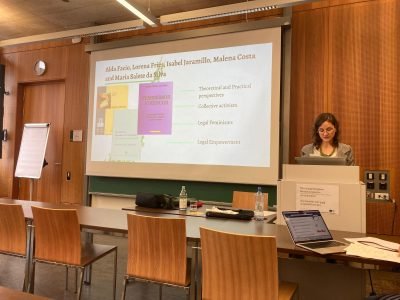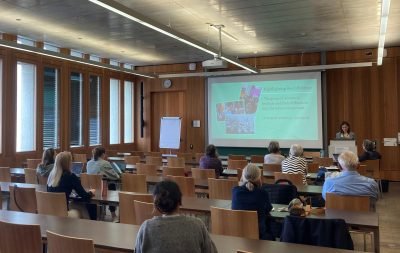What about Women’s Legal History?: Gendered and Intersectional Perspectives on the Legal Historical Field
Global Convivial Forum
Aline Correa (UzK | Mecila)
Image by Aline Correa.
Image by Aline Correa.
Dr. Massuchetto’s reflections involve a general approach to different feminist interpretations of law, bringing to the theoretical framework a discussion about feminisms and legal empowerment in Latin America.
On 16 May, 2024, our guest Kanzler-fellow Vanessa Massuchetto shared a bit about her research on women’s legal history, focusing on gendered and intersectional perspectives, with the University of Cologne’s academic community.
For many years, the Center for Latin American Studies (CLAC) and the Working Group Spain-Portugal-Latin America (ASPLA) have been organizing an interdisciplinary lecture series on topics related to Latin America in the fields of cultural studies, political science, and economics. The topic of the lecture series this semester is “Global History 2.0 Challenges, Criticism and Impulses from Latin America”, proposing to discuss theoretical perspectives and empirical research projects on Latin America (and occasionally also on other regions of the global South). Aiming to foster fruitful discussion from the global South for a non-Eurocentric global history, the visiting scholars are invited to reflect on their research topics from this perspective, taking the opportunity to look for limits, alternative reinterpretations, and further developments.
Massuchetto’s lecture presented a comprehensive overview of women’s legal history as a field of research. Through a methodological approach, Massuchetto incorporates gender perspectives into the examination of legal phenomena, discussing the intersection of feminist jurisprudence, legal history, and women’s history, promoting dialogue on the treatment of gender disparities in history.

Her reflections involved a general approach of different feminist interpretations of law, bringing to the theoretical framework a discussion about feminisms and legal empowerment in Latin America. Discussing her case study, she showed how, in the second half of the 18th century in Paranaguá, a colony located in southern Brazil, women had agency in their defense in ecclesiastical and secular courts in cases of rape. Through a feminist reading of the law and a careful study of the sources, she demonstrates how it is possible to recognize the agency of these women and how they operated. Acting on the basis of the written or socially valid norms of the period, they interpreted and moved the law structure in their favor. The analyzed case showed how it is possible to move away from stereotypes of exclusion, submission, or excessive religiosity.
Vanessa Massuchetto will remain in Cologne until the end of June, and she will also present on 19.06.2024 a contribution entitled “Rape, Promises of Marriage and Violence: Women’s Knowledge of Normativity in the Province of Paraguay (18th century)” at the Research Colloquium of the Department of Latin American History at the University of Cologne.

